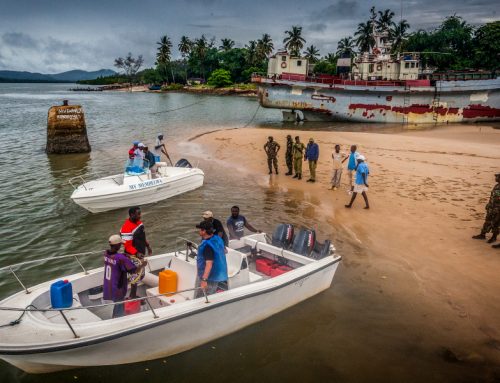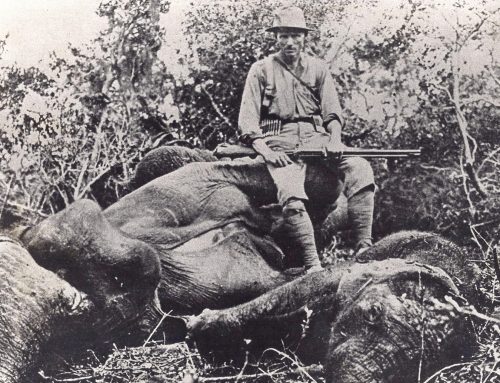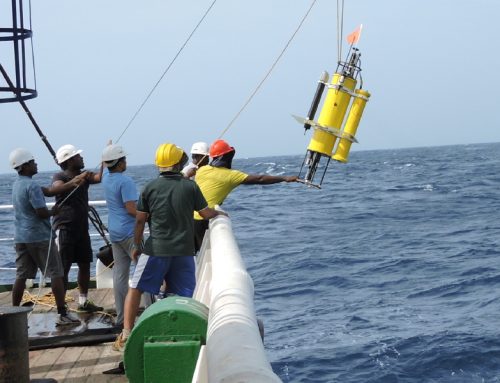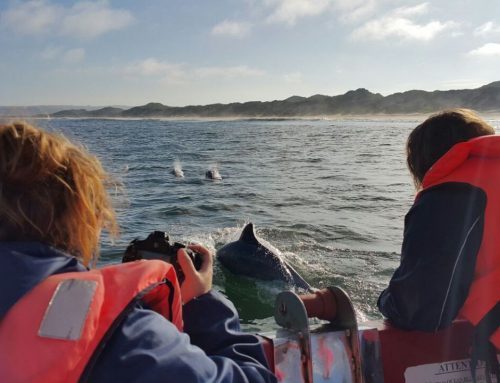 In their small, brightly painted boats the fishermen head out to sea. On some days they return with a haul of fresh linefish for their families and some extra to sell. On other days they return empty-handed.
In their small, brightly painted boats the fishermen head out to sea. On some days they return with a haul of fresh linefish for their families and some extra to sell. On other days they return empty-handed.
They rank amongst the thousands of small-scale fishers along South Africa’s coastline who work exceptionally hard for their living, and who have been practising traditional fishing and harvesting methods for generations. Which is why, when some of them were told several years back, that they could not continue because their area has been proclaimed a Marine Protected Area (MPA), they understandably felt that marine conservation and legislation was against them, and many defied the proclamation, effectively becoming poachers.
This created a deadlock between marine conservation and certain coastal communities because the small-scale fishers need fish and seafood for survival while South Africa needs MPAs (which are the breeding grounds for many marine species of national importance) to ensure a sustainable supply of fish and seafood into the future.
Towards resolving this situation the WWF Nedbank Green Trust agreed to finance The Human Dimensions Project led by WWF’s Integrated Ocean Management Programme Manager Peter Chadwick to understand the full implications of MPAs on these fisher communities, with the hope of finding sustainable solutions for all parties. As a result, in 2011, for the first time in South Africa, small-scale fishers sat around the table with conservation authorities, conservation organisations and social scientists to discuss how the small-scale fishers and coastal communities can be meaningfully included in the planning, management and benefits of MPAs – of which South Africa currently has 21.
“For MPAs to succeed we have to create a sense of ownership and protection of the marine resources amongst the small-scale fishers and coastal communities,” says Chadwick whose team includes Professor Merle Sowman and Dr Serge Raemaekers – Inshore/Small-scale Fisheries Governance, Environmental Evaluation Unit (EEU) at the University of Cape Town – and several Masters and PhD students. Each of the students is based at one of several case study sites and fisher communities along South Africa’s coastline.
These are: Hluleka MPA and Dwesa-Cwebe MPA in the Eastern Cape, Langebaan Lagoon MPA (West Coast National Park), Struisbaai/Agulhas/Kogelberg in the Western Cape and Cape Peninsula (Table Mountain MPA).
“Several are proclaimed MPAs, others are potential MPAs and others are proclaimed MPAs that will potentially be incorporated into larger marine management areas, such as the Struisbaai/Agulhas/Kogelberg area, which extends some 150 kilometres,” Chadwick explains.
The first eighteen months of this three-year project are now completed, during which time the team gathered substantial information and understanding of the communities and their perspective of the MPAs. At the same time the team investigated the socio-economic opportunities from which the communities can potentially benefit by assisting with biodiversity conservation. Very much part of this is the new Small-scale Fisheries Policy which was gazetted earlier this year to address the needs of small-scale fishers, and which will apportion inshore resources more equitably.
In the Dwesa-Cwebe region, for example, PhD student Jackie Sunde engaged fishing communities on the issue of illegal linefishing and harvesting of coastal seafood in this MPA. The small-scale fishers explained that they were never consulted about the proclamation of the MPA, which took away their livelihood. At the same time this MPA is critically important from a national conservation perspective because it is the spawning ground for species like Kob/Kabeljou and White Steenbrass, which are under serious threat. Kob is down to approximately 4% of its original population.
Sunde’s research was incorporated into a two-day planning meeting in April 2012 convened by the Department of Environmental Affairs (DEA), which manages the MPAs, and attended by a range of officials across local, provincial and national agencies, as well as natural and social scientists. Sunde and Raemaekers were asked to give a presentation on the ‘Human Dimensions’ of the Dwesa-Cwebe MPA at the meeting, which contributed towards a deepened understanding of the complex factors impacting biodiversity conservation and sustainable livelihoods in the MPAs. This will help to inform management policies and SANParks’ Resource Use Strategy.
“It is very clear that if we want to solve the conflict around MPAs, such as poaching, we need to implement practical management policies that include the community, such as preferential access and community managed sanctuary areas,” says Raemaekers. “This would allow the small-scale fishers to claim their traditional fishing areas, and at the same time it would allow the resources time to recover, and therefore sustain the communities’ supply.”
Raemaekers offers the example of a woman in a coastal community who is head of her household and who harvests mussels, limpets and red bait to feed her family. “There is no question she will risk getting caught in the MPA because for her it is about survival. These are the forgotten people who don’t partake in high-level biodiversity conversations, and the inclusion of their needs is essential in the spatial planning of MPAs.”
In this and other areas the Human Dimensions Project team will be putting forward practical guidelines that will hopefully be acceptable to both the fisher communities and to the DEA and to the Department of Agriculture, Forestry and Fisheries (DAFF). “In the Struisbaai/Agulhas/Kogelberg area, for example, the broad principle is that 80% of the inshore zone will be for local restricted use, based on the Small-scale Fisheries Policy, while 20% will be set aside as a ‘no tag’ area to allow the resources to recover,” says Chadwick. Currently there is only the Bettys Bay MPA, which spans four kilometres of coastline and extends two nautical miles offshore.
Through engagement and inclusion of the local communities they hope to encourage a sense of ownership and protection of the local resources. At the same time, WWF has appointed a market transformation manager to look into market opportunities for the small-scale fishers to improve their livelihoods.
“If we get this project right, it will change the way that MPAs in South Africa are managed into the future, with small-scale fishers playing an important role,” says Chadwick.




